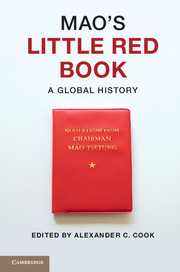Book contents
- Frontmatter
- Contents
- List of illustrations
- List of contributors
- Preface
- 1 Introduction
- 2 A single spark
- 3 Quotation songs
- 4 Mao quotations in factional battles and their afterlives
- 5 Translation and internationalism
- 6 Maoism in Tanzania
- 7 Empty symbol
- 8 The influence of Maoism in Peru
- 9 The book that bombed
- 10 Mao and the Albanians
- 11 Partisan legacies and anti-imperialist ambitions
- 12 Badge books and brand books
- 13 Principally contradiction
- 14 By the book
- 15 Conclusion
- Index
- References
5 - Translation and internationalism
Published online by Cambridge University Press: 05 June 2014
- Frontmatter
- Contents
- List of illustrations
- List of contributors
- Preface
- 1 Introduction
- 2 A single spark
- 3 Quotation songs
- 4 Mao quotations in factional battles and their afterlives
- 5 Translation and internationalism
- 6 Maoism in Tanzania
- 7 Empty symbol
- 8 The influence of Maoism in Peru
- 9 The book that bombed
- 10 Mao and the Albanians
- 11 Partisan legacies and anti-imperialist ambitions
- 12 Badge books and brand books
- 13 Principally contradiction
- 14 By the book
- 15 Conclusion
- Index
- References
Summary
The people who have triumphed in their own revolution should help those still struggling for liberation. This is our internationalist duty.
Patriotism and InternationalismFrom its founding in 1949, the young People’s Republic of China (PRC) fully recognized the importance of translation and treated it as a significant part of its cultural diplomacy and exchange. In hopes of creating a global language of Maoist revolution, the Chinese government subsidized the publication and distribution of numerous foreign-language publications, such as China Pictorial, China Reconstructs, and Peking Review. But none of these could rival Mao Zedong’s Little Red Book in visibility and influence. China’s Foreign Languages Press translated Quotations from Chairman Mao, otherwise known as the Little Red Book, into dozens of languages and arranged for global distribution of the book, and in the eight months from October 1966 to May 1967, the International Bookstore successfully sent copies to more than a hundred countries. This major translation undertaking was seen as an invaluable contribution to socialist internationalism and to the development of global revolution. This chapter details how, when, and by whom the text of the Little Red Book was translated, and how the book itself, as a material object, came to stock bookshelves around the world. Drawing on oral history interviews, memoirs, and archival research, this chapter argues that the global success of the Little Red Book should be seen as part of New China’s extended efforts to translate Chinese literature, revolutionary theory, and Mao’s works into different languages, potentially serving as a common and universal currency of revolution. In other words, the popularity of the Little Red Book in the 1960s was based on the cumulative efforts of the PRC since its establishment to build a global book distribution network through the International Bookstore, as well as its consistent emphasis on the role of translation in promoting Mao’s work under the auspices of the Foreign Languages Press. In my discussion, I am particularly interested in these two important institutions, which played crucial roles in promoting Quotations from Chairman Mao. The development of these two institutions and the evolution of some major policies related to the translation will be mapped out. Moreover, complementary to these two institutions, I will also discuss other ways of spreading the content of the Little Red Book to the world, such as radio broadcasts and by sailors.
- Type
- Chapter
- Information
- Mao's Little Red BookA Global History, pp. 76 - 95Publisher: Cambridge University PressPrint publication year: 2014
References
- 4
- Cited by



